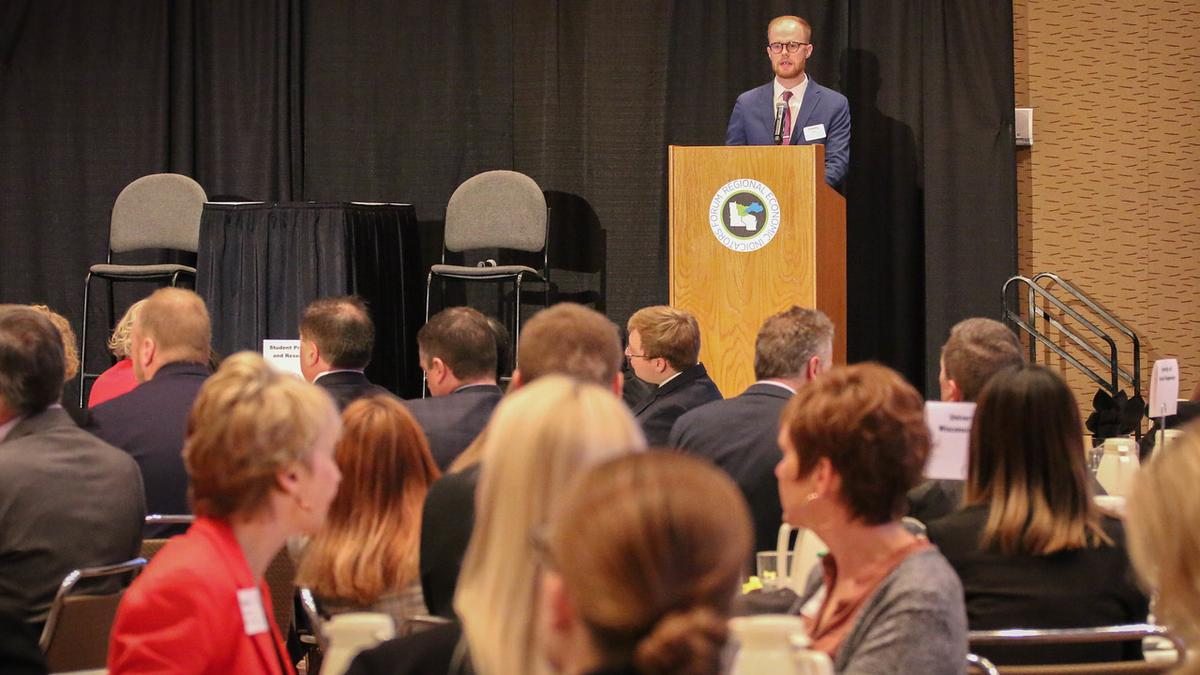A unique collaborative effort of the area’s three main universities—LSBE (UMD), the College of St. Scholastica (CSS), and the University of Wisconsin Superior (UWS)—where students present on the economic research they have conducted over the past six months has been taking place bi-annually for over the past five years.
The Regional Economic Indicators Forum (REIF), an economic business event sponsored by National Bank of Commerce, has grown to a community-wide anticipated event that brings together over 250 business professionals, community leaders, students, college instructors, and others to learn about the current vitality of our regional economy. The REIF region consists of 15 counties within Northeastern Minnesota and Northwestern Wisconsin.
The breakfast presentation consists of insight on the consumer confidence index provided by a UWS student, the business confidence index as presented by CSS’s student, and the regional equity index (a measure of stock performance) presented by another UWS student. Insight on general business indicators like employment rate, labor force, growth, and gross regional product is presented by an LSBE student. There also is a guest speaker whose talk aligns with an economic topic of relevance to our area.
LSBE student, Tommy Olafson, a senior with an Economics and Statistics double major, presented at the REIF event held this past fall. Olafson is one of the undergraduate research assistants for UMD’s Bureau of Business and Economic Research (BBER), an arm of the Labovitz School. The REIF is just one of the BBER’s many economic analysis projects.
With fall semester being Olafson’s last, he wanted to experience presenting at the REIF and spent approximately 50 hours over two months as a student employee gathering and analyzing data and preparing his presentation.
“After all the hard work I put into the research and presentation,” said Olafson, “there was an amazing sense of achievement I felt afterward having finally presented my work to over 250 people.”
As a senior, Olafson knows the value of what he’s learned. “Experiences like the REIF help set you apart from other job applicants, and there are acquired skills that you’ll tap into if you have to research and present in your career. “
“The benefits that our student presenters experience are amazing,” said Monica Haynes, BBER director. “Nine BBER students have presented over the past five years. We have seen the quality of the presentations improve, student confidence go up, and the audience really continue to respond to the information the students are sharing. Of course, students get the invaluable experience of presenting to a huge audience in a high-pressure environment, but they also learn applied research skills, data visualization skills, and time management strategies.”
Student attendees also benefit by hearing their peers present important information and networking with people who may turn out to be potential employers, mentors, or the link to that perfect job.
“Students are able to connect with the broader business community not just in being educated about issues relevant to the local economy but also quite literally in that they are sharing breakfast and coffee with local business professionals,” said Haynes.
As one of the approximately 40 students from the three universities, LSBE’s Megan Badger, Economics major, found the event to be a valuable experience.
“As a senior soon to enter the workforce, I found that the REIF provided me with useful information about the region’s employment demographics, several economic indicators, and new hiring strategies for local businesses,” said Badger. “I also strengthened and made new connections during the networking time before and after the presentations.”
While the alliance formed with the three universities may seem unique, they each are striving for the same goal.
“The collaboration of the three schools showcases the amazingly talented student population that exists in the community.” said Haynes. “We want attendees to walk away with concrete ideas and action items that they can take to their coworkers, bosses, and local representatives and say, ‘We should be doing this.’”
The next REIF takes place on Tuesday, March 31, with Ron Wirtz, director of regional outreach for the Federal Reserve Bank of Minneapolis, as guest speaker. The event will be held in the DECC’s Harbor Side Ballroom from 7:00 a.m. to 9:30 a.m. In the first half hour, students from LSBE, UWS, and CSS will hold a poster session showcasing the variety of research projects that they have conducted this past year.
More about the REIF can be found on the National Bank of Commerce website. More information about the BBER, a UMD entity that has been benefiting business and industry for over 50 years, can be found on the LSBE website under Centers and Outreach.
